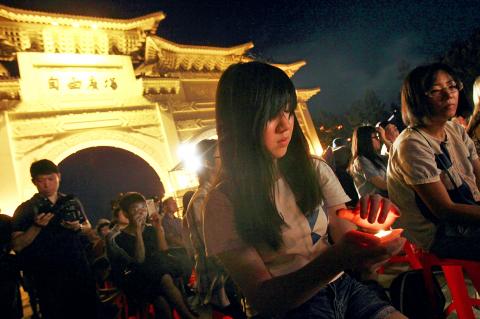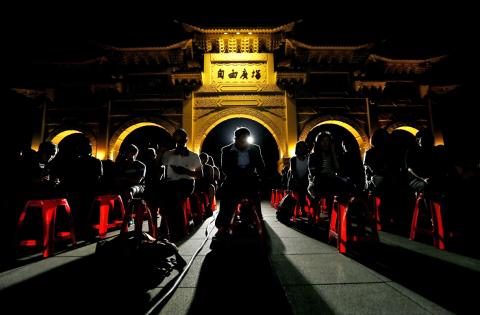Several hundred activists last night gathered in Taipei’s Liberty Square for an event commemorating the 1989 Tiananmen Square Massacre in Beijing, condemning continued human rights abuses by the Chinese government.
Organized by the Student Workshop for Promoting China’s Democracy, the New School for Democracy, the Friends of Liu Xiabo (劉曉波) and the National Taiwan University Student Council, and with the support of a handful of local human rights groups, the event’s site was symbolic, as it was the location of important student demonstrations during Taiwan’s democratization, including an overnight rally on June 3, 1989, in support of the protesters in Tiananmen Square in Beijing.
Lights were dimmed and several moments of silence were observed for the massacre victims, with last night’s event marked by songs interspersed with speeches by several prominent overseas activists, along with Taiwanese human rights figures, who at one point took to the stage holding photographs of political prisoners.

Photo: Chiang Ying-ying, AP
“The spirit of Tiananmen is extremely important to us Tibetans, because we also have been oppressed,” said Lukar Jam, an activist with the Gu-Chu-Sum Movement of Tibet who flew in from India for the event. “The struggle against authoritarianism cuts across nationality and citizenship.”
Wuer Kaixi, an ethnic Uyghur political dissident who participated in the 1989 Tiananmen protests, said President Tsai Ing-wen’s (蔡英文) statement yesterday about the massacre was “disappointing,” because it used “incident,” not “massacre” to refer to the event.
He said “incident” echoed official Chinese government terminology downplaying Tiananmen’s severity, adding that Tsai saying that she did not desire to “point fingers” at China’s political system was also disappointing.

Photo: RITCHIE B. TONGO, EPA
“We have never felt that China’s democratization was the responsibility of Taiwan and Hong Kong, but China’s democratization would absolutely serve as a guarantee of Taiwan’s and Hong Kong’s democracy, so pushing forward China’s democracy is a project we can work on together,” Wuer Kaixi said.
“The issue of Tiananmen should not be something that separates people who identify as Taiwanese or Chinese,” he said, adding that the absence of Chinese students from yesterday’s event might be the result of a message by the event’s organizers.
Event coordinator Chou Ching-chang (周慶昌), a member of the Student Workshop for Promoting China’s Democracy, said that “three to five” Chinese students had volunteered behind the scenes, attributing the low participation to the event’s sensitivity, while other activists said Chinese students organized another event at Shih Chien University in Taipei.
While the annual Tiananmen memorial event was originally hosted by the Bound with Blood Friends of the Mainland Democratic Movement, which emphasizes common “Chinese” ethnicity, in recent years the event’s focus has shifted to emphasizing universal human rights concerns with a broad “pan-green” participation.
“While back in the day you could make appeals to patriotism, Chinese nationalism does not have the same attraction anymore,” Taiwan Human Rights Association secretary-general Chiu E-ling (邱伊翎) said.
Representatives from the Democratic Progressive Party were notably absent from the event, which featured speakers from the Chinese Nationalist Party (KMT), the Green Party Taiwan, the Social Democratic Party and the New Power Party, with Chou attributing their absence to the short notice given by the organizers, whom he said invited political representatives only last week because of “rushed” preparations.
Activists said that the event’s planning was thrown into disarray by the withdrawal of the Taiwan Association for China Human Rights, which had previously provided half of the event’s funding.

SECURITY: As China is ‘reshaping’ Hong Kong’s population, Taiwan must raise the eligibility threshold for applications from Hong Kongers, Chiu Chui-cheng said When Hong Kong and Macau citizens apply for residency in Taiwan, it would be under a new category that includes a “national security observation period,” Mainland Affairs Council (MAC) Minister Chiu Chui-cheng (邱垂正) said yesterday. President William Lai (賴清德) on March 13 announced 17 strategies to counter China’s aggression toward Taiwan, including incorporating national security considerations into the review process for residency applications from Hong Kong and Macau citizens. The situation in Hong Kong is constantly changing, Chiu said to media yesterday on the sidelines of the Taipei Technology Run hosted by the Taipei Neihu Technology Park Development Association. With

CARROT AND STICK: While unrelenting in its military threats, China attracted nearly 40,000 Taiwanese to over 400 business events last year Nearly 40,000 Taiwanese last year joined industry events in China, such as conferences and trade fairs, supported by the Chinese government, a study showed yesterday, as Beijing ramps up a charm offensive toward Taipei alongside military pressure. China has long taken a carrot-and-stick approach to Taiwan, threatening it with the prospect of military action while reaching out to those it believes are amenable to Beijing’s point of view. Taiwanese security officials are wary of what they see as Beijing’s influence campaigns to sway public opinion after Taipei and Beijing gradually resumed travel links halted by the COVID-19 pandemic, but the scale of

A US Marine Corps regiment equipped with Naval Strike Missiles (NSM) is set to participate in the upcoming Balikatan 25 exercise in the Luzon Strait, marking the system’s first-ever deployment in the Philippines. US and Philippine officials have separately confirmed that the Navy Marine Expeditionary Ship Interdiction System (NMESIS) — the mobile launch platform for the Naval Strike Missile — would take part in the joint exercise. The missiles are being deployed to “a strategic first island chain chokepoint” in the waters between Taiwan proper and the Philippines, US-based Naval News reported. “The Luzon Strait and Bashi Channel represent a critical access

Pope Francis is be laid to rest on Saturday after lying in state for three days in St Peter’s Basilica, where the faithful are expected to flock to pay their respects to history’s first Latin American pontiff. The cardinals met yesterday in the Vatican’s synod hall to chart the next steps before a conclave begins to choose Francis’ successor, as condolences poured in from around the world. According to current norms, the conclave must begin between May 5 and 10. The cardinals set the funeral for Saturday at 10am in St Peter’s Square, to be celebrated by the dean of the College